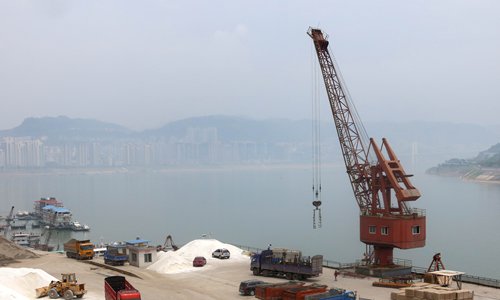
Rare earths are unloaded at a port in Southwest China's Chongqing on May 9 in 2019. Photo: IC
China's rare-earth exports to the US are not being restricted and are continuing unaffected, but reviews of such an option may have been done and measures could be taken against foreign companies that hurt China's interests, when necessary, experts and industry sources said.
Western media reports claimed that China is imposing export controls on rare-earth minerals that are crucial for the production of the US F-35 fighter jets and other advanced weaponry, The Financial Times reported on Tuesday, citing unidentified sources.
"The government wants to know if the US may have trouble making F-35 fighter jets if China imposes an export ban," a source told the newspaper
However, several senior industry analysts reached by the Global Times on Wednesday said that China has not imposed any export controls on rare earths that target the US.
"China does not restrict rare-earth exports to the US except on the basis of counter-terrorism and national security ground, or in extreme circumstances such as during wartime," a senior industry insider told the Global Times on condition of anonymity, noting that the current exports to the US are based on market demand, both in price and volume.
Chinese rare-earth producers' shares rose in Hong Kong on Wednesday, with China Rare Earth Holdings up more than 14 percent, and Aluminum Corp of China up 4 percent, reacting to speculation over tightened supplies.
"The rise in rare-earth prices has something to do with the rising production of electric vehicles," an industry expert told the Global Times on Wednesday.
In addition, as a heavily polluting industry, production of rare earths often comes at a high environmental cost and is set to be rationalized by capping capacity in a bid to achieve carbon neutrality, meeting the commitment that China set under the Paris Climate Agreement, experts said.
China produces more than 90 percent of the world's rare earths. As a result of the pandemic, China's rare-earth exports totaled just over 35,000 tons in 2020, compared with 46,000 tons the year before.
Experts said that if the world economic downturn continues into the new year, rare-earth exports will likely fall further.
A source with a state-owned Chinese rare-earth company told the Global Times on Wednesday that there are no restrictions being imposed by China when it comes to rare-earth exports to the US and that media reports are being overhyped.
"But there could be an export restriction in the future," the source noted without further elaboration.
Some analysts also pointed out that relevant assessments have definitely been done, given the US' heavy reliance on rare earths from China, the world's biggest exporter.
A draft rare-earth management rule was revealed by the Ministry of Industry and Information Technology in January, which included quota management of domestic rare-earth production, investment management and supervision.
The draft is widely interpreted by industry insiders as a sign that China intends to standardize management of the rare-earth industry and promote its high-quality development. But some experts also said that measures could be taken against foreign companies that hurt China's interests when necessary.
China was selling rare earths at a very low price, inflicting quite high environmental costs at home, and the situation is set to change driven by the demand for industry regulation, Wang Zhongkui, vice president of the Tin Branch of the China Nonferrous Metals Industry Association, told the Global Times.
Meanwhile, the regulation does not signal export controls targeting any particular country.
China has no intention to use rare earths as a countermeasure against any country, which would only serve to accelerate development of rare earths in other markets, said experts.
Former US president Donald Trump raised the "China threat" last September when he signed an executive order to expand the mining of rare earths.
However, even during that particular period, China's rare-earth exports to the US continued. Experts said that the exports may also continue under the Biden administration.




